
Welcome to the 5-0
Celebrating CBA Members Licensed Since 1975
November 2025
Download This Article (.pdf)
Judge Steve C. Briggs
License Date: 10/6/1975
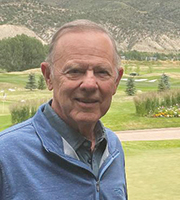 Future judge Steven C. Briggs grew up in a farming community in Oklahoma. He started college there, but after two years transferred to the University of Michigan, where he received his undergraduate degree. He tried a semester of graduate work in Berkeley, dropped out, and headed to Denver. He says he had visited Colorado while in college and had fallen in love with the beautiful countryside and the mountains, “where the stars didn’t twinkle at night.”
Future judge Steven C. Briggs grew up in a farming community in Oklahoma. He started college there, but after two years transferred to the University of Michigan, where he received his undergraduate degree. He tried a semester of graduate work in Berkeley, dropped out, and headed to Denver. He says he had visited Colorado while in college and had fallen in love with the beautiful countryside and the mountains, “where the stars didn’t twinkle at night.”
After finishing law school at Boulder in 1975, Briggs took a clerkship with Chief Judge Alfred A. Arraj, who became his mentor and hero. He recalls fondly that when an attorney and client entered the late judge’s courtroom, “all power, politics, and money were checked at the door.”
After his clerkship, Briggs joined the Colorado Attorney General’s Office, in their antitrust department. “I liked prosecuting greedy price fixers,” he says with a grin.
Two years later, he joined the firm he clerked for in law school, Hutchinson Black, Hill and Cook in Boulder, where he handled civil litigation for 14 years. In 1992, the seasoned litigator applied for and was appointed to the Colorado Court of Appeals.
Briggs left the bench at the end of the 1990s to pursue a career in mediation and arbitration. “My passion was helping people come to a resolution of their disputes at the least financial and emotional cost,” he says.
Retirement two years ago has left the senior judge with more time to focus on travel and his golf game. He has finally been able to shoot his age in golf. He says, “The most important qualification is being old!”
During his career, Briggs has served as a guest speaker for over 40 public and CLE seminars. When asked what his chosen TED Talk theme would be, he says, “Beware of the Siren Call of Zealous Advocacy—It Is a Myth Full of Mischief.”
Judge James S. Casebolt
License Date: 10/6/1975
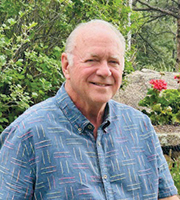 James S. Casebolt, a proud Colorado native, has seen a lot of changes during his 50 years of practice. The biggest one was the introduction of computers to the workplace: “In 1994, when I began on the Colorado Court of Appeals, there were no electronics, so I brought in my own computer and drafted opinions on it. I was probably one of the first to do so.”
James S. Casebolt, a proud Colorado native, has seen a lot of changes during his 50 years of practice. The biggest one was the introduction of computers to the workplace: “In 1994, when I began on the Colorado Court of Appeals, there were no electronics, so I brought in my own computer and drafted opinions on it. I was probably one of the first to do so.”
Today, all pleadings are filed electronically, but it wasn’t always like that. “I used to file my own pleadings at the Mesa County District Court and then stop in to chat with the judge,” reminisces Casebolt. “I remember when LexisNexis started. I would invite other attorneys working on our cases to come to my office and use it for research. It was pretty pricey back then, and some attorneys thought that this was an unfair advantage because they couldn’t afford it.”
Casebolt continues, “Needless to say, computers have changed the practice. It has become less personal; people don’t talk to each other regarding the strengths and weaknesses of their cases. They rely on computers too much.”
Casebolt didn’t intend to become an attorney. As an English literature major at Colorado College in Colorado Springs, he wanted to become a college professor. But after investigating that career path in his junior year, he changed his mind and decided to follow in the footsteps of his grandfather and uncle, both judges, by enrolling in the law school at the University of Colorado. Casebolt also joined the Air National Guard during this time and was assigned to Buckley Air Force base in Aurora, Colorado. As luck would have it, the Guard had a band that played at officers’ clubs, and needed a piano player. Casebolt got the job and played swing and jazz music from the big band era for three years.
Casebolt says his mother, Josephine Cole Casebolt, was his greatest inspiration. “She was very bright. She helped develop my purpose in life and exercised a lot of influence.”
After graduating from law school in 1975, the future judge joined an insurance defense firm in Grand Junction and traveled for 20 years on the Western Slope of Colorado, representing many counties and municipalities, until his appointment to the bench. Casebolt believes that his greatest achievement was setting an example for attorneys on collegiality and always being honest regarding a case’s merits. As a judge, he wrote an article for the bench on how to work together. Explains Casebolt, “It’s harder to remain collegial as the court gets bigger.”
Casebolt is wary of the changes that technology may bring to the legal profession. During the pandemic, people wouldn’t come to the courthouse, and a lot of judges discovered that they could stay home and do their work remotely. “I hope the future doesn’t eliminate the courthouse,” says the former deputy chief judge.
After retiring from the bench in 2015, Casebolt served as a mediator for the Judicial Arbiter Group. In this capacity, he would make recommendations for settling cases. But he found it difficult to juggle his work as a senior judge, substituting for other judges, with his role as a mediator, trying to resolve cases with attorneys. So, he retired from JAG after several years.
With more free time on his hands, Casebolt loves to travel with his wife, Nancy Williams (the couple married in Florence, Italy, in 1999). He is also an avid gardener. Both he and his wife volunteer for the Center for the Arts in Evergreen, Colorado, which is their home, and have been pleased at how the organization has grown.
Philip A. Cherner
License Date: 10/6/1975
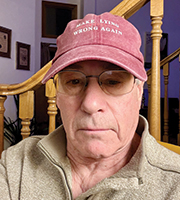 Future criminal lawyer Philip A. Cherner was born and raised in Detroit, Michigan. He was in high school when the historic 1967 Detroit rebellion broke out, and the budding photographer managed to capture several compelling photos that were later featured in the news.
Future criminal lawyer Philip A. Cherner was born and raised in Detroit, Michigan. He was in high school when the historic 1967 Detroit rebellion broke out, and the budding photographer managed to capture several compelling photos that were later featured in the news.
Cherner went on to attend college at the University of Michigan, where he faced the Vietnam War lottery during his sophomore/junior year. He received a medical deferment, and during this time decided to attend law school. “I woke up one morning and decided to become a criminal defense attorney. It was my way to do something about the world as it fell apart.”
Recalls Cherner, “The first nine months at Vanderbilt Law School in Nashville were the most intensive period of my life. I learned to think all over again. It was a game changer!”
After graduation, the new lawyer moved to Colorado in 1975 for its blue skies and dry air. He didn’t want to work for a big law firm, so Cherner worked at a Sears department store changing tires while building up his law practice. In less than a year, his law practice was doing well enough that he was able to quit his job at Sears.
Cherner’s biggest professional achievement occurred many years later when, in 2013, he helped get Nathan Dunlap’s death penalty sentence postponed indefinitely by Governor John Hickenlooper. Dunlap had been found guilty of murdering four of his former coworkers during a 1993 attack inside a Chuck E. Cheese. Dunlap, who was 19 years old when he committed the crime, was later diagnosed with severe bipolar disorder. His sentence was eventually commuted to life in prison without parole when Colorado repealed the death penalty in 2020, an effort that Cherner helped bring about through his work with Coloradans for Alternatives to the Death Penalty.
Along with changes in the field of criminal law itself, Cherner has witnessed considerable changes in the make-up of the profession over his 50-year career. When he was at Vanderbilt, only 15 out of 150 students were women. But today, with women better represented in the legislature and defense practice, the dynamic has changed. Cherner recalls observing a client who was charged with a sex offense come to grips with the fact that both the prosecutor and the judge were women. Cherner continues, “Cases that were once laughed at regarding women and children are given more priority and treatment. In the criminal arena, sex cases are now their own area of expertise. The rules are different. The entire probation and Department of Corrections world has become specialized. Even the rules for victims have improved, from no standing to having all kinds of rights, including a national victim’s movement.”
Now that his house is paid off, Cherner has retired from active practice, but he is still involved in other legal endeavors, such as serving as a member of the Office of Attorney Regulation Counsel Character and Fitness Committee, serving as an expert in post-conviction matters, and sponsoring Rwandan refugees from the Democratic Republic of Congo.
He also has more time to take photographs and play his guitar (the latter is a skill he picked up in the seventh grade). One of his greatest inspirations is lead guitarist and founder of the Grateful Dead, Jerry Garcia, whom Cherner was fortunate to have seen perform many times before his death in 1995. As for photography, Cherner has had several photos featured on the cover of Colorado Lawyer over the years.
Cherner believes that everything has been worth it, “The whole shebang. I was born to be a criminal defense attorney. It’s in my genes.”
Craig Fleishman
License Date: 10/6/1975
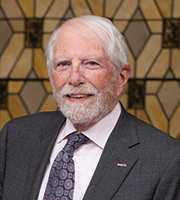 The Vietnam War molded Captain Alan Craig Fleishman into a future lawyer. Fleishman began his military training as a student in the University of Colorado’s Reserve Officers’ Training Corps (ROTC) program. Upon graduating in 1968, the young Fleishman was commissioned as a second lieutenant and sent to officer training school in Virginia.
The Vietnam War molded Captain Alan Craig Fleishman into a future lawyer. Fleishman began his military training as a student in the University of Colorado’s Reserve Officers’ Training Corps (ROTC) program. Upon graduating in 1968, the young Fleishman was commissioned as a second lieutenant and sent to officer training school in Virginia.
From there, he was sent to the US Army School Europe in Oberammergau, Germany, where he taught government contracting to men and women from the NATO countries after receiving schooling in that area. While in Germany, Fleishman had the opportunity to see the Oberammergau Passion Play, which depicts the life and death of Jesus. Legend has it that the villagers prayed to be spared from the bubonic plague that devastated Bavaria in 1633. In exchange, they vowed to perform the play every 10 years. As the story goes, there were no deaths from the Black Death in the village after the vow.
After about a year and a half in Oberammergau, Fleishman was promoted to captain and transferred to Vietnam, where was in charge of transferring boats and ships to the South Vietnamese during President Richard Nixon’s administration. For his efforts, Captain Fleishman was awarded the Bronze Star for meritorious achievement. In Saigon, Fleishman also had the opportunity to take the LSAT. He parked his M-16 rifle in the corner and sat to take the test.
After leaving the service, Fleishman bummed around Asia, Africa, and South America for six months until law school at the University of Denver began in 1972. Once at law school, Fleishman had to take a class in government contracting, so he approached the dean and told him about his experience teaching the class in the Army. The dean was impressed and made him a teaching assistant for the course. He later clerked for a law firm that specialized in medical malpractice and personal injury, thus beginning his career as a litigator.
In 1989, Fleishman started Gelt, Fleishman and Sterling with two very prominent lawyers, Ted Gelt and Harry Sterling. Fleishman explains why managing this 22-person law firm was his greatest professional achievement: “It was financially successful and had a commitment to ethics, quality of work, and professionalism.” This experience also made him critical of law schools for not preparing students for the business aspects of operating a law firm. “Law schools are focused on case law, writing skills, and legal analysis; they overlook the need for students to be able to understand balance sheets, profit and loss statements, marketing, and the importance of insurance. This makes graduates ill-equipped to advise clients.”
Fleishman currently serves as special counsel to the family law firm of Epstein Patierno. He is active in several community and charitable organizations, including a scholarship fund to help epileptic children attend summer camp. The fund was named in honor of his deceased son, Jason, who contracted meningitis and died at age 23, one day after his college graduation. The fund’s name has changed, but the mission remains the same.
In his 50 years of practice, Fleishman has been pleasantly surprised by the increase in the number of women in the profession. When he attended law school, there were only two female law students. Now, over 50% of law students are women. However, he has also noticed a decline in respect and congeniality among attorneys. “Lawyers have become nastier than the lawyers from the 1970s. They are more combative and not focused on being problem solvers for their clients.”
Fleishman adds, “I am afraid that the future of law will become more demanding on an attorney’s time and more expensive for clients. This pressure will make the practice of law less responsive.” Despite this, Fleishman believes that the law is a profession with great opportunity for financial success and positive contributions to society.
David J. Myler
License Date: 10/6/1975
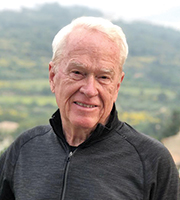 Imagine working for $23 a month as an attorney. This is how David J. Myler began his legal career. However, before attending law school, Myler joined the Michigan National Guard during the Vietnam War era. He attended officer candidate school, which delayed his law school admission. Upon completion, he was transferred to Colorado with an assignment to guard toxic nerve gas containers. The Michigan native began attending the University of Denver Law School while still in the national guard.
Imagine working for $23 a month as an attorney. This is how David J. Myler began his legal career. However, before attending law school, Myler joined the Michigan National Guard during the Vietnam War era. He attended officer candidate school, which delayed his law school admission. Upon completion, he was transferred to Colorado with an assignment to guard toxic nerve gas containers. The Michigan native began attending the University of Denver Law School while still in the national guard.
Myler recalls his first attempt to find a job after the bar exam. “I took a briefcase full of résumés and walked up and down 17th Street in Denver dropping them off at law firms.” This effort resulted in one interview (he wasn’t hired). He retreated back to the law school and noticed an advertisement on the bulletin board. A small Colorado law firm wanted to open an office in Rangely on the Western Slope, which was on an oil shale field. With no other prospects, Myler called the firm and moved to the town of 2,500 people. The firm paid for all of his expenses and, as the only attorney in town, he began to handle traffic tickets, contracts, and divorces. After a couple of years, he hired an associate and started to represent the junior college and the local hospital.
“I was never an oil and gas attorney, but I knew enough to be conversant,” reflects Myler. “I was more involved in the creation of special districts.” Two projects stand out: the creation of a recreation center and that of a sub-district of Colorado Water, for purposes of building a dam. “I did the paperwork,” he says proudly.
Myler was very fortunate to be hired as the first town attorney for Snowmass Village shortly after incorporation. He considers his greatest achievement to be the annexing of 3,000 acres of Snowmass ski area into the town of Snowmass Village. After that, the legislature changed the rules so that this couldn’t happen again. Today the area is operated by the Aspen Skiing Company.
For the rest of his career, Myler spent most of his time in land development projects. “I take a lot of pride in what we created,” recalls the 50-year practitioner. “I would convince my clients to give back to the community in a way that would be well received.” One example was the joint venture between Roaring Fork Schools, which owned the land on which a middle school was built, Pitkin County, and Habitat for Humanity. The partnership created Basalt Vista, an affordable housing development for the schoolteachers and county workers, in which the income of future buyers was capped.
Myler recently closed his law office. “There’s been an evolution in attorneys,” he comments. “It used to be more congenial in which friendships were created. This was one of the joys of practicing.” Myler continues, “Today, it is less congenial. Attorneys are becoming more difficult to communicate with, partly due to technology. Some attorneys have never met each other to shake hands.” He is also worried about the reduction or elimination of courts under the present administration.
Despite these challenges, he beams with pride to share that his son just passed the New York bar exam, while his daughter finished college with a degree in public policy and administration and works for the city of Fort Collins. “There is nothing I enjoy more than being called ‘Dad.’”
Judge Daniel M. Taubman
License Date: 9/15/1975
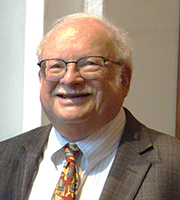 Daniel M. Taubman graduated from Cornell University in 1969 and Harvard Law School in 1974 before entering the profession as a legal services attorney. Following a clerkship, Taubman’s first jobs were with Pikes Peak Legal Services in Colorado and the Center on Social Welfare Policy and Law in New York City. In 1982, he joined the now defunct Colorado Coalition of Legal Services Programs, where he worked as a staff attorney for a year and then served as its director for the next decade.
Daniel M. Taubman graduated from Cornell University in 1969 and Harvard Law School in 1974 before entering the profession as a legal services attorney. Following a clerkship, Taubman’s first jobs were with Pikes Peak Legal Services in Colorado and the Center on Social Welfare Policy and Law in New York City. In 1982, he joined the now defunct Colorado Coalition of Legal Services Programs, where he worked as a staff attorney for a year and then served as its director for the next decade.
At the Coalition, Taubman successfully litigated several class actions challenging the termination or denial of social security disability benefits. In addition, he litigated Sullivan v. Everhart, 494 U.S. 83 (1990), a class action social security disability case that addressed how the Social Security Administration offset alleged overpayments against underpayments of benefits. Although Taubman’s clients prevailed in the federal district court and the Tenth Circuit Court of Appeals, the US Supreme Court decided against his clients in a 5-4 decision.
Taubman’s judgeship came just a few years later with his appointment to the Colorado Court of Appeals in 1993. A native of Brooklyn, New York, Taubman’s inspiration to become a judge can be traced back to his post-law-school clerkship with US District Court Judge Charles E. Stewart, Jr. for the Southern District of New York. And although his own father was an entertainment lawyer, Taubman recounts that he had always been fascinated by appellate law.
Judge Taubman served on the court of appeals for nearly three decades, until his retirement in 2020. One of the more interesting cases he heard was Masterpiece Cakeshop v. Colorado Civil Rights Commission, 584 U.S. 617 (2018). The case, which gained nationwide media attention, involved a Lakewood baker who refused to make a wedding cake for a gay couple because of his religious beliefs. The Colorado Civil Rights Commission ordered the baker to make the cake, and he again refused. It was appealed to the court of appeals, which upheld the commission’s decision. The Colorado Supreme Court denied certiorari, but the US Supreme Court granted it and reversed the state’s decision on an issue not addressed in the court of appeals decision.
Now semi-retired, Judge Taubman believes that joining the legal profession is worthwhile and that it has a lot of opportunities for new lawyers to help people—and he practices what he preaches. He has been involved with the Colorado Access to Justice Commission since 2004, helping to establish the licensed legal paraprofessional program and increase pro bono service and limited scope representation. This passion for access to justice motivated him to write a law review article advocating that attorneys should provide 50 hours of pro bono work or pay $500, an idea he continues to endorse.
Judge Taubman has also been involved in the “We the People: the Citizen and the Constitution” curriculum through the Center for Civic Education, where he has helped elementary, middle school, and high school students learn about the Constitution and the Bill of Rights for the past 30 years. He has served as a judge for the national and state competitions, which simulate a congressional hearing. He also continues to spend 60 to days per year filling in for other judges on the court of appeals, something he enjoys.
Taubman and his wife have a quadruple blended family, with eight grown children and 17 grandchildren. He and his wife enjoy traveling and have visited many European countries, Australia, New Zealand, and Israel.
If Taubman had not become a lawyer, he would have liked to become a baseball announcer. He fell in love with the game when he was 7 years old and attended his first Brooklyn Dodgers game at Ebbets Field. Now he’s a Colorado Rockies fan.
Christopher J. Webb
License Date: 10/6/1975
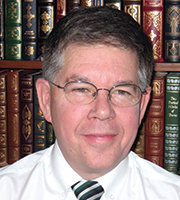 Christopher J. Webb spent his early childhood in Farmington Hills, Michigan, but moved to Colorado at the age of 12. His mother had bought a 600-acre ranch in Durango following her divorce, and it was there that Webb learned to take care of cattle and ride a horse.
Christopher J. Webb spent his early childhood in Farmington Hills, Michigan, but moved to Colorado at the age of 12. His mother had bought a 600-acre ranch in Durango following her divorce, and it was there that Webb learned to take care of cattle and ride a horse.
The history major was planning to go to Cambridge to become a professor, but he reconsidered his career after his mother passed away during his senior year at Yale University. He decided to go to law school. “It was difficult,” Webb reflects. “I now had to put myself through law school at the University of Colorado.” Upon graduating in 1975, Webb went to work for a law firm in Durango for $150 per month. “Durango was very established and old school; therefore, I found the experience difficult.”
It was during this time that his estranged father came to visit him and inquired if he would join the family business as in-house counsel. Webb’s grandfather, a mechanical engineer, formed Jervis B. Webb Company in 1915, after mechanizing the assembly line at Ford Motor Company. He had modified a forged chain used in the mining industry for use in automobile assembly. This “Keystone chain” was patented, and the company became the chief supplier to Ford and General Motors. In 1977, Webb moved to Michigan, took the bar exam, and began as inside counsel.
Webb took the structure of the law and applied it to his grandfather’s company to make it more efficient. For example, he sought to protect the company’s intellectual property by licensing it worldwide, and he put outside law firms on a credit card, with a set limit, so they couldn’t exceed the limit with their hourly billing.
Today, this global company supports integrated material handling systems such as baggage handling and automatic guided vehicles. It was purchased in 2007 by Daifuku Co., a Japanese company now located in Novi, Michigan.
Reflecting on his law school training, Webb says there were two things he had to deal with in his position as in-house counsel that he never learned in law school: how to negotiate with very strong individuals and how to mediate conflicts. “Law school classes are geared for litigation, using the Socratic method to teach us to deal with confrontation and not resolution.” Webb has observed that many companies are now seeking other routes to litigation by using the American Arbitration Association.
Webb is now working as a mediator and arbitrator in Michigan. The CBA has reached out to him to teach a CLE in Mediation 2.0.
As to the future, Webb sees an economic downturn for attorneys. “Michigan is not a rich environment for attorneys. A lot of attorneys are unhappy. This is evident in the number of mergers of law firms. There was an expectation that a law degree would open a door to security. This is no longer the case.” He concludes that the legal system needs to consider how to become more efficient and fairer.


